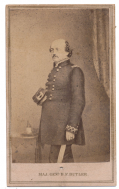site search
online catalog
LITHOGRAPH CDV OF MAJOR GENERAL BENJAMIN BUTLER

$50.00
Quantity Available: 1
Item Code: 490-3200II
Shipping: Determined by Method & Location of buyer
To Order:
Call 717-334-0347,
Fax 717-334-5016, or E-mail
Three-quarter standing CDV view of Butler posed holding his cap in front of him. He wears a dark double-breasted frock coat with oak leaf decorations on the collar and cuffs. His cap has a wreath on the front of the crown with “MASS” at center.
Image has good contrast and only light surface dirt on the mount and paper. Bottom center of the mount is marked “MAJ. GEN. B. F. BUTLER.”
Reverse has photographer’s imprint for E. & H. T. ANTHONY…FROM A BRADY NEGATIVE.
Benjamin Butler became one of the most disliked generals of the war, upsetting many on both sides of the conflict. Butler graduated from Colby College in Maine in 1838, and was admitted to the Massachusetts Bar in 1840, where he established a large criminal practice. He was elected to the Massachusetts House of Representatives in 1853, and then to the Senate of the Commonwealth in 1859. While in office, he attended the Democratic convention where he voted for Jefferson Davis to run for the presidential nomination, as well as candidates such as John C. Breckinridge. He entered the Massachusetts Militia in 1839, and was promoted to brigadier general in 1855 even though he had no formal military training.
At the outbreak of the Civil War, Butler played an important role because he and the 8th Massachusetts were some of the first troops to reach Washington DC, protecting the capital in case Maryland seceded. He was appointed a major general on May 16, 1861, being one of the first appointed by President Abraham Lincoln. He first saw action at the battle of Big Bethel, where he was defeated. He then commanded Fort Monroe, where Butler became the first to identify slaves who ran away into Union lines as “contraband of war,” despite the Fugitive Slave Act of 1850. In August of 1861, Butler led a successful amphibious assault on the Hatteras Inlet in North Carolina, and moved onto New Orleans in May, after the city had already surrendered to Admiral David G. Farragut. It was during this time that Butler would gain many of his enemies.
Once in New Orleans, he was appointed as military governor, and commanded the city in rather controversial ways. Although he was able to bring order to the city, he became known as one who would pilfer goods of the Southern households he was watching. He issued Order 28 during this time period, which stated that any lady in New Orleans who showed contempt for Union soldiers would effectively be treated as though they were a prostitute. This law drew great controversy in both the North and South, caused Confederate president Jefferson Davis to label Butler and outlaw, and earned him the nickname “Beast Butler.” He was removed from this position in December of 1862, and given command of the Department of Virginia and North Carolina in November of 1863, which would become known as the Army of the James. While commanding this force, he performed poorly during the Bermuda Hundred campaign, allowing Confederate general P.G.T. Beauregard to slow him down with an inferior force. He went on to fail once again at Fort Fisher, North Carolina, and was ordered by Union general Ulysses S. Grant to return home to await orders. On November 30, 1865, Butler resigned his commission.
He returned to politics, and was elected governor of Massachusetts in 1882 after several unsuccessful campaigns. In 1878, he was once again elected to Congress, and was a presidential candidate during the election of 1884. He died January 11, 1893. [ad][ph:L]
~~~~~~~~~~~~~~~~~~~~~~~~~~~~~~~~~~~
THIS ITEM, AS WITH ALL OTHER ITEMS AVAILABLE ON OUR WEB SITE,
MAY BE PURCHASED THROUGH OUR LAYAWAY PROGRAM.
CLICK HERE FOR OUR POLICIES AND TERMS.
THANK YOU!
Inquire About LITHOGRAPH CDV OF MAJOR GENERAL BENJAMIN BUTLER
For inquiries, please email us at [email protected]
Most Popular
Historical Firearms Stolen From The National Civil War Museum In Harrisburg, Pa »
Theft From Gravesite Of Gen. John Reynolds »
Selection Of Unframed Prints By Don Troiani »
Fine Condition Brass Infantry Bugle Insignia »
British Imported, Confederate Used Bayonet »
Scarce New Model 1865 Sharps Still In Percussion Near Factory New »
featured item
28th NEW JERSEY PAINTED REGIMENTAL EAGLE DRUM IDENTIFIED TO DRUMMER AARON BUZZEE, COMPANY K: FREDERICKSBURG AND CHANCELLORSVILLE!
This Civil War regimental eagle drum has a totally original painted designation to the 28th New Jersey and drummer Aaron Buzzee of Company K. The regiment enlisted for just nine months service in Fall 1862, but found itself in two momentous battles:… (766-1858). Learn More »
site search
Upcoming Events
May 16 - 18: N-SSA Spring Nationals, Fort Shenandoah, Winchester, VA Learn More »




